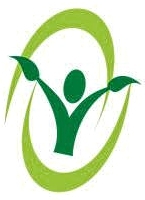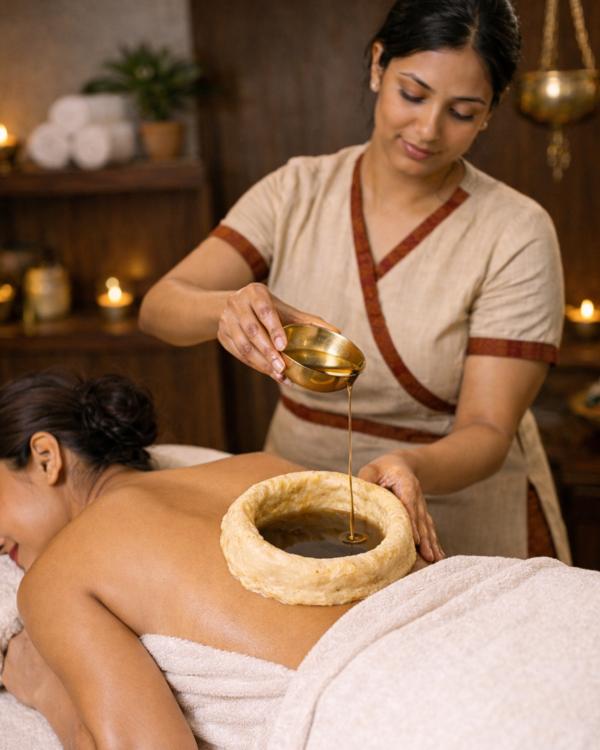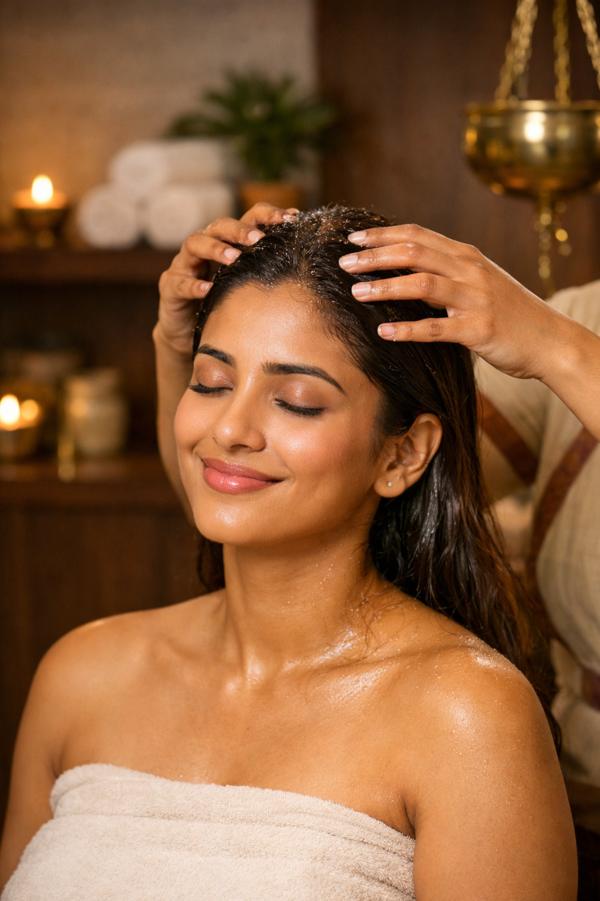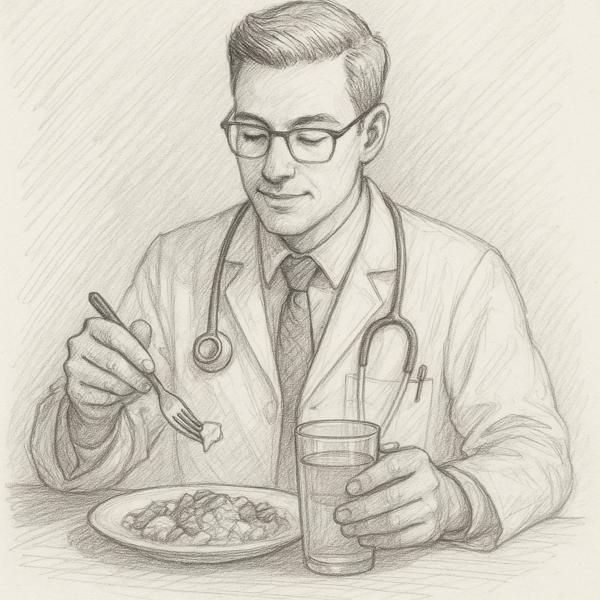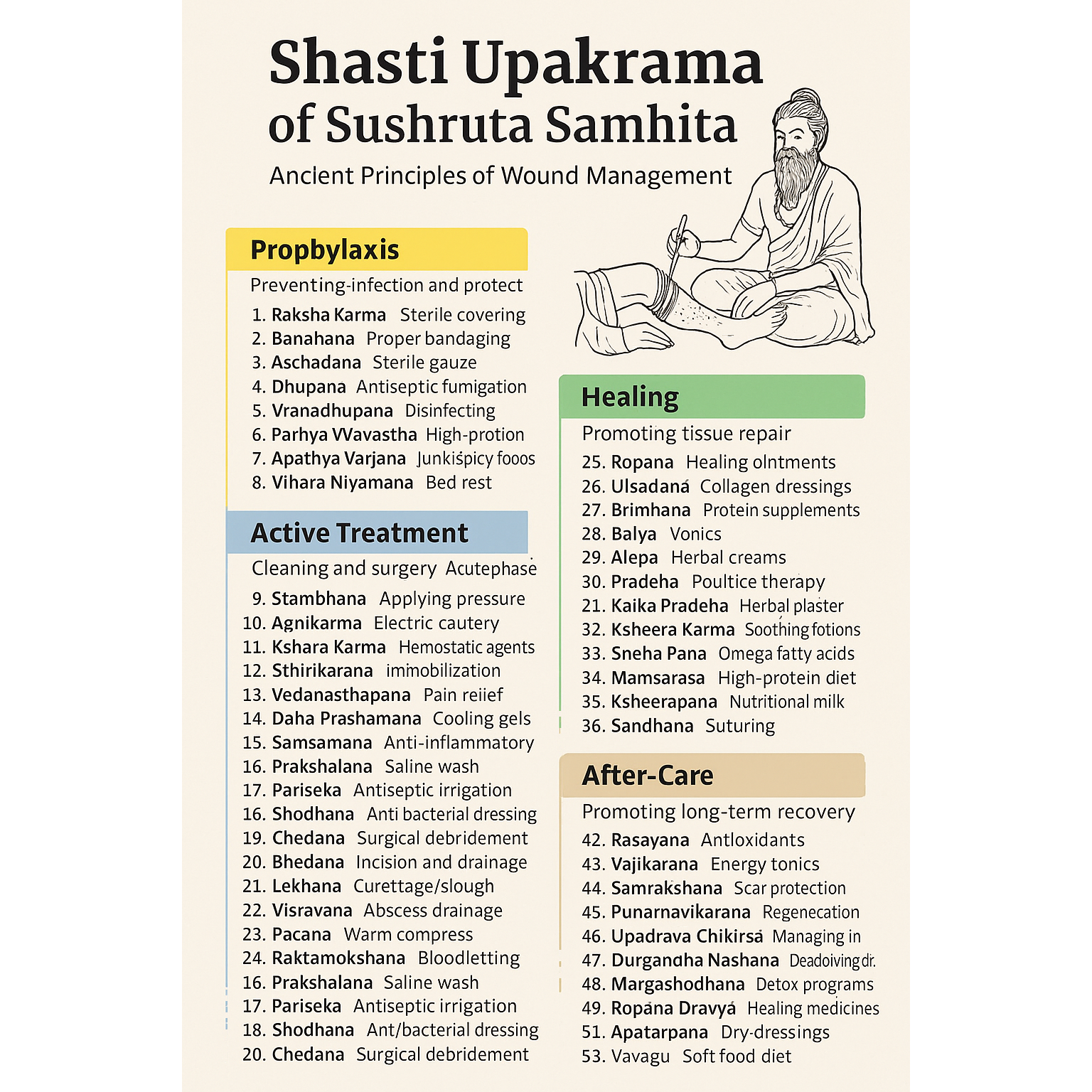
More than 2,000 years ago, the great Indian surgeon Acharya Sushruta described a complete system of wound care called “Shasti Upakrama”, which means sixty different methods of treating wounds.
Modern medicine calls this “wound management.” Sushruta had already explained all stages of wound care – from prevention, cleaning, surgery, healing, and after-care.
Even today, doctors follow the same principles, though using modern tools.
Below is a simple explanation of all 60 treatments in easy language.
Group 1: Prophylactic Care (Before and Early Protection of Wounds)
These methods prevent infection and protect the wound.
- Raksha Karma – Protecting the wound from dust and insects
- Modern example: Using sterile covering
- Bandhana – Proper bandaging
- Example: Surgical dressing
- Acchadana – Covering the wound
- Example: Sterile gauze
- Dhupana – Herbal smoke for killing germs
- Example: Antiseptic fumigation
- Vranadhupana – Special wound fumigation
- Example: Disinfecting wound room
- Pathya Vyavastha – Healthy diet advice
- Example: High-protein diet
- Apathya Varjana – Avoiding harmful food
- Example: Avoid junk and spicy foods
- Vihara Niyamana – Lifestyle control
- Example: Bed rest and limited movement
Group 2: Immediate Care After Injury (Acute Phase)
These methods stop bleeding and prevent complications.
- Stambhana – Stopping bleeding
- Example: Applying pressure
- Agnikarma – Heat cauterization
- Example: Electric cautery
- Kshara Karma – Chemical cauterization
- Example: Chemical hemostatic agents
- Sthirikarana – Stabilizing the wound
- Example: Immobilizing the body part
- Vedanasthapana – Pain relief
- Example: Painkillers
- Daha Prashamana – Burning sensation relief
- Example: Cooling gels
- Samsamana – Reducing inflammation
- Example: Anti-inflammatory medicines
Group 3: Cleaning and Removing Dead Tissue (Cleansing Phase)
These remove pus and unhealthy tissue.
- Prakshalana – Washing the wound
- Example: Saline wash
- Pariseka – Pouring medicated liquid
- Example: Antiseptic irrigation
- Shodhana – Detoxifying the wound
- Example: Antibacterial dressing
- Chedana – Cutting dead tissue
- Example: Surgical debridement
- Bhedana – Opening pus-filled areas
- Example: Incision and drainage
- Lekhana – Scraping unhealthy tissue
- Example: Curettage
- Visravana – Letting out pus
- Example: Draining abscess
- Pacana – Helping pus to mature
- Example: Warm compress
- Raktamokshana – Removing bad blood
- Example: Controlled bloodletting
Group 4: Healing and Tissue Building Stage
- Ropana – Promoting healing
- Example: Healing ointments
- Utsadana – Raising depressed tissue
- Example: Collagen dressings
- Brimhana – Nourishing the body
- Example: Protein supplements
- Balya – Strengthening tissues
- Example: Tonics
- Alepa – Applying medicated paste
- Example: Herbal creams
- Pradeha – Thick herbal paste
- Example: Poultice therapy
- Kalka Pradeha – Herbal plaster
- Example: Herbal bandage
- Ksheera Karma – Milk-based therapy
- Example: Soothing lotions
- Sneha Pana – Internal oil therapy
- Example: Omega fatty acids
- Mamsarasa – Meat soup therapy
- Example: High-protein diet
- Ksheerapana – Milk intake
- Example: Nutritional milk
Group 5: Surgical Repair Stage
- Sandhana – Joining tissues
- Example: Suturing
- Sutra Karma – Stitching techniques
- Example: Surgical sutures
- Avsadana – Suppressing excess tissue
- Example: Treating overgrown granulation tissue
- Avasadana – Controlling abnormal tissue
- Example: Scar control therapy
- Pratisarana – Rubbing medicines
- Example: Local drug application
- Lekhana Karma – Advanced scraping
- Example: Surgical cleaning of chronic wounds
Group 6: Systemic Detox and Support Therapies
- Vamana – Therapeutic vomiting
- Example: Detox therapy (rarely used now)
- Virechana – Controlled purgation
- Example: Medical bowel cleansing
- Asthapana Basti – Decoction enema
- Example: Medicated enema
- Anuvasana Basti – Oil enema
- Example: Lubricating enema
- Nasya – Nasal therapy
- Example: Nasal drops
- Svedana – Steam therapy
- Example: Warm fomentation
- Abhyanga – Oil massage
- Example: Therapeutic massage
Group 7: After-Care and Long-Term Recovery
- Rasayana – Rejuvenation therapy
- Example: Antioxidant supplements
- Vajikarana – Strength-building therapy
- Example: Energy tonics
- Samrakshana – Protection of healed area
- Example: Scar protection
- Punarnavikarana – Tissue regeneration
- Example: Regenerative therapy
- Upadrava Chikitsa – Treating complications
- Example: Managing infection
- Durgandha Nashana – Removing bad smell
- Example: Deodorizing dressings
- Margashodhana – Cleaning body channels
- Example: Detox programs
- Ropana Dravya – Healing medicines
- Example: Antibiotic ointments
- Prakopa Nashana – Balancing body reactions
- Example: Anti-allergy medicines
- Apatarpana – Reducing excess discharge
- Example: Dry dressings
- Yavagu – Light liquid diet
- Example: Soft food diet
- Pathya Ahara – Long-term healthy eating
- Example: Balanced diet for recovery
Conclusion – Why Shasti Upakrama Is Still Relevant Today
Even in today’s world of modern hospitals and technology, doctors follow the same steps:
✔ Clean the wound
✔ Stop bleeding
✔ Remove dead tissue
✔ Prevent infection
✔ Stitch the wound
✔ Give nutritional support
This shows that Sushruta’s science was far ahead of its time and is still useful today.
